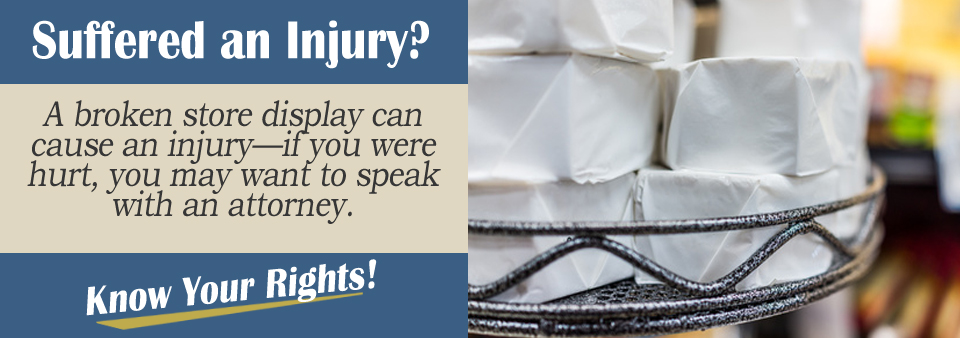If you have been hurt by a broken display while shopping, you may not know whether you have any recourse. Can you sue the storeowner for your damages? What should you expect? The law does protect you when you are hurt by the negligence of a storeowner due to a broken display.
We asked attorney, Alaina Sullivan, about what to do in a situation like this. Here's what she had to say:
You Are an Invitee
Per the law, you are an invitee when you enter a store. They want you to come shop their store, and the mere act of being open for business means you are invited to come into the store. However, you do not do so at your own risk. You are entitled to expect a level of safety from undue harm while you are on the store’s property.
That safety starts as soon as you park your car and continues as you shop around the store. You do not necessarily have to purchase anything either. So long as you are in the store, you are covered.
This coverage extends to customers, contractors, wholesales, and pretty much anyone there to do business.
You Should Expect a Duty of Care
You hear the term “duty of care” a lot when it comes to negligence. Essentially a duty of care is a legal protection from harm. The store must do everything possible within reason to ensure that their customers are safe from dangerous conditions that could result in any injuries.

Not following this duty of care is normally a result of the store’s negligence. This means the store is liable for damages the customer receives because of their negligence.
You Carry the Burden of Proof
However, simply being hurt while in the store is not enough to show negligence. You are the party responsible for proving that the storeowner breached his duty to follow this duty of care and that your injuries are a direct result of this breach.
To prove a case for retail negligence, you must show:
- 1. Your injury was caused by a dangerous condition in the store, meaning the broken store display;
- 2. The storeowner knew of the dangerous condition or at least should have foreseeably known that it existed;
- 3. Despite this knowledge, the retailer failed to repair or get rid of the dangerous condition, leaving the display broken;
- 4. You, as the customer, did nothing to contribute to your injury;
- 5.The broken display or dangerous condition was the direct and proximate cause of your injuries; and
- 6. You were injured to the point that the damages sought are reasonable and actual.
Helping Prove Your Case
The first thing you should always do whenever injured is to call 911 or ask for medical help. Also, be sure to ask the store employees for the manager or owner. Ask for them to complete a store incident report, and make sure you have a copy.
Before you leave the store, also make sure that you have the contact information for the store’s liability insurance company.
Also, get the names and contact information for any employees or customers who saw the accident. If possible, take pictures of the scene and the broken display that caused your injury should the store later dispute that the dangerous condition existed.
Sometimes you can get surveillance video of the incident depending on the store.
Lastly, it cannot be emphasized enough: with any personal injury, you must go see your doctor as soon as possible after an accident or at least go to an emergency room. Do this as soon as you can after the accident so no question exists as to whether any subsequent behavior on your part contributed to the injuries.
The store’s insurance company will do anything possible to mitigate the damages paid so make sure they cannot lower the amount of damages you deserve.
Contact an Attorney Today
A licensed personal injury attorney will be able to evaluate your case and determine if you have a claim against the other party’s insurance company. For the best chance of receiving the compensation you need to pay for medical bills, auto body bills, and pain and suffering, you should speak with a personal injury attorney in your area today.